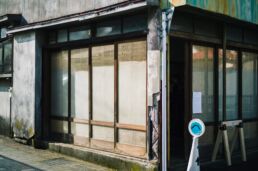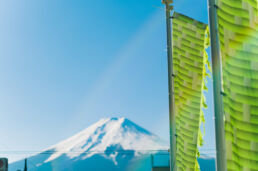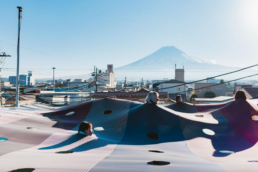When you enter Saruya’s lounge you may notice the bottles lined up on the wall. These bottles are all herbal teas for the guests to enjoy. The blends are mainly made from Japanese ingredients such as “Yuzu” and “Kuromame.”
These herb teas are blended by “HERBSTAND,” a Shimoyoshida-based herb grower and producer. HERBSTAND’s fields are about a 15-minute walk from SARUYA. When I went there, I found a variety of herbs planted in about 20 separate spaces. There are about 60 kinds of herbs grown there, but they also collect some that grow wild in the mountains. For Mr. Hirano, there is no such thing as a useless plant.
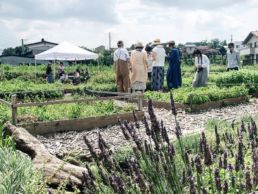
The compost is vegetable-based, using the leaves and branches of the herbs themselves unlike the general image of compost made from livestock manure. With the soft mineral water flowing from the northern foothills of Mt. Fuji and the nutrient-rich soil containing volcanic ash, the herbs that are grown here don’t need strong fertilizer to exude a rich aroma.
This might be why the medicinal herbs that were collected in this area a long time ago were presented to the Edo Shogunate.
Mr. Hirano has been familiar with nature and herbs since he was a child, influenced by his mother who is well versed in natural medicine. But his experience during a road trip in New Zealand was the determining factor. One of his hosts, whenever he took a break or at lunch time, would pick herbs from the garden, wash them quickly, and brew herb tea just by pouring hot water over them. In New Zealand, there are herb stores everywhere, and the custom of self-care using plants rather than medicine has taken root. Witnessing this, Mr. Hirano began to think that he would like to introduce to Japan this lifestyle that incorporates herbs in daily life.
However the price of pesticide-free herbs in Japan is too high to incorporate them into daily life. There are herb farms all over the country, but most of them specialize in specific varieties, and few producers handle a wide range of varieties. In order to realize affordable prices, a system that produces a wide range of herbs on a certain scale would be necessary. Initially, Mr. and Mrs. Hirano were just selling herbs and herbal tea, but they quickly realized that they needed to be working in the fields.
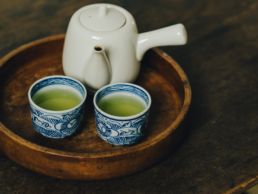
Saruya’s investment in the preservation and reanimation of Fujiyoshida matches with Mr. and Mrs. Hirano’s vision. Since there are many guests from overseas, Saruya asked HERBSTAND to make blends of mainly Japanese ingredients so they could enjoy comparing them to the flavors from their home country. Some are relatively familiar, such as “RYOKUCHA” and “YUZU”, and some are a bit surprising even to Japanese people, such as “SHISO” and “KINMOKUSEI”, making you want to try them. Coffee is good when you arrive tired from a long trip or after a hard day of sightseeing, but herbal tea, which is gentle on the stomach and has many benefits, is more soothing.
This year, Saruya selected three of the most popular herbal teas and made them available for purchase. The flavors are yuzu, osmanthus, and chai, and the blends include lemongrass and ginger to create well-balanced infusions. The hexagonal kraft package is assembled and stamped manually at Saruya with original illustrations by Chisato Nagano.
In the future, there are plans for a joint program where people can stay at SARUYA and participate in farming at HERBSTAND’s fields.
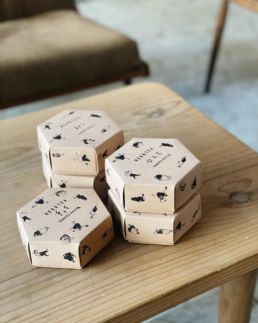
The herbs that Mr. Hirano made me smell at HERBSTAND fields were all unique, but many of them had a nostalgic feel, as if I had smelled them somewhere before. Memories came flooding back one after another, such as the dishes I ate or the cocktails I drank on my travels. Even though herbs don’t often play a leading role in cooking, they are as important as other spices. We should not underestimate the power of scent, as it can unexpectedly penetrate deeply into our memories. Your experience in Fujiyoshida will be engraved in your memory along with the flavor of the herbal teas you drink at Saruya. And one day you might suddenly remember this time fondly and wish to come back.
Written by:
Yumi Igarashi
I live in Yamanashi Prefecture. I worked for a resort hotel management company for 10 years, and after visiting Karuizawa, Ishigakijima, and Fukushima, I've been working as a freelance hotel management advisor and writer for several years. I don't remember how I got involved with Saruya, but I've been coming and going, helping out with work or just visiting.


